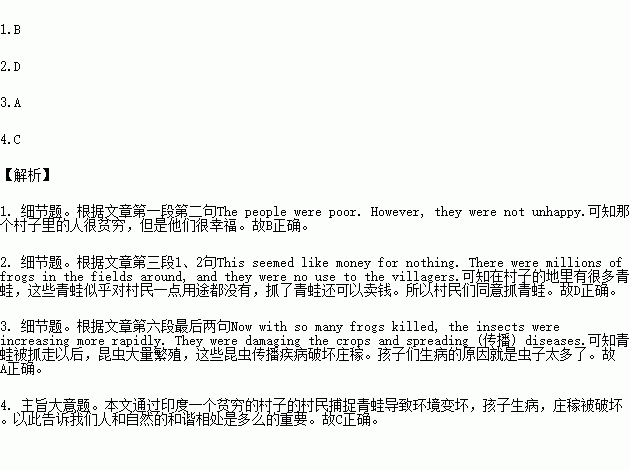题目内容
阅读下列四篇短文,从每小题后所给的A、B、C、D四个选项中,选出最佳选项,并在答题卡上将该选项涂黑。
It was a village in India. The people were poor. However, they were not unhappy. After all, their forefathers had lived in the same way for centuries.
Then one day, some visitors from the city arrived. They told the villagers there were some people elsewhere who liked to eat frog’s legs. However, they did not have enough frogs of their own, and so they wanted to buy frogs from other places.
This seemed like money for nothing. There were millions of frogs in the fields around, and they were no use to the villagers. All they had to do was to catch them. Agreement was reached, and the children were sent into the fields to catch frogs. Every week a truck arrived to collect the frogs and hand over the money. For the first time, the people were able to dream of a better future. But the dream didn’t last long.
The change was hardly noticed at first, but it seemed as if the crops were not doing so well. More worrying was that the children fell ill more often, and there seemed to be more insects around lately.
The villagers decided that they couldn’t just wait to see the crops failing and the children getting weak. They would have to use the money earned to buy pesticides (杀虫剂) and medicines. Soon there was no money left.
Then the people realized what was happening. It was the frog. They hadn’t been useless. They had been doing an important job—eating insects. Now with so many frogs killed, the insects were increasing more rapidly. They were damaging the crops and spreading (传播) diseases.
Now, the people are still poor. But in the evenings they sit in the village square and listen to sounds of insects and frogs. These sounds of the night now have a much deeper meaning.
1.From Paragraph 1 we learn that the villagers __________.
A. worked very hard for centuries
B. were poor but satisfied
C. dreamed of having a better life
D. lived a different life from their forefathers
2.Why did the villagers agree to sell frogs?
A. The frogs made too much noise.
B. They needed money to buy medicine.
C. They wanted to please the visitors.
D. The frogs were easy money.
3.What might be the cause of the children’s sickness?
A. There were too many insects.
B. The crops didn’t do well.
C. The visitors brought in diseases.
D. There were too many frogs.
4.What is the main idea of the text?
A. Happiness comes from peaceful life in the country.
B. Health is more important than money.
C. The harmony (和谐) between man and nature is important.
D. Good old day will never be forgotten.

